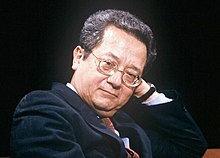Jacques Vergès
| Jacques Vergès | |
|---|---|

Appearing on TV discussion After Dark in 1987
|
|
| Born |
5 March 1925 Ubon Ratchathani, Rattanakosin Kingdom, Siam (now Thailand) |
| Died | 15 August 2013 (aged 88) Paris, France |
| Residence | Paris, France |
| Nationality | French and Algerian |
| Education | University of Paris law degree |
| Occupation | Lawyer |
| Known for | Lawyer who represented well-known war criminals |
| Spouse(s) | Djamila Bouhired |
| Children | Jacquou Vergès (1951), Meriem Vergès (1967), Liess Vergès (1969) |
| Parent(s) | Raymond Vergès , Pham Thi Khang |
Jacques Vergès (5 March 1925 – 15 August 2013) was a lawyer who earned fame continually from the 1950s, first as an anti-colonialist communist figure and then for defending a long string of well-known clients, from an anti-colonialist Algerian militant, Djamila Bouhired (his future wife) in 1957–1962 to former Khmer Rouge head of state Khieu Samphan in 2008. His clients included both left wing and right wing terrorists, war criminals, and militants, including Holocaust denier Roger Garaudy, Nazi war criminal Klaus Barbie (1987), and international terrorist Ilich Ramírez Sánchez a.k.a. Carlos the Jackal (1994). In 2002, Vergès offered to represent former Serbian President Slobodan Milošević, although Milošević declined any legal advice from any party. The media sensationalized Vergès's activities with the sobriquet "the Devil's advocate", and he himself contributed to his "notorious" public persona by such acts as titling his autobiography The Brilliant Bastard and giving provocative replies in interviews. He claimed that "I'd even defend Bush! But only if he agrees to plead guilty."
Born on 5 March 1925 in Ubon Ratchathani, Siam, and brought up on the island of Réunion, Jacques Vergès was the son of Raymond Vergès, a French diplomat, and a Vietnamese mother. In 1942, with his father's encouragement, he sailed to Liverpool to become part of the Free French Forces under Charles de Gaulle, and to participate in the anti-Nazi resistance. In 1945 he joined the French Communist Party. After the war he went to the University of Paris to study law (while his twin brother Paul Vergès went on to become the leader of the Reunionese Communist Party and a member of the European Parliament). In 1949 Jacques became president of the AEC (Association for Colonial Students), where he met and befriended Pol Pot. In 1950, at the request of his Communist mentors, he went to Prague to lead a youth organization for four years.
...
Wikipedia
